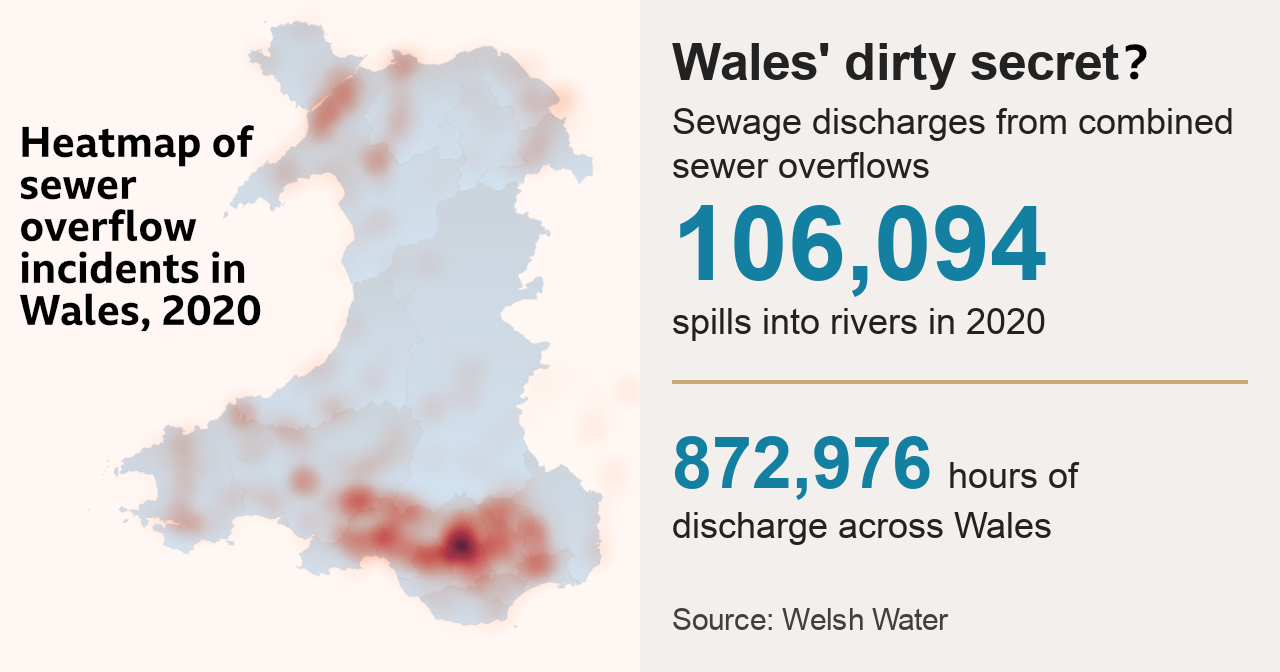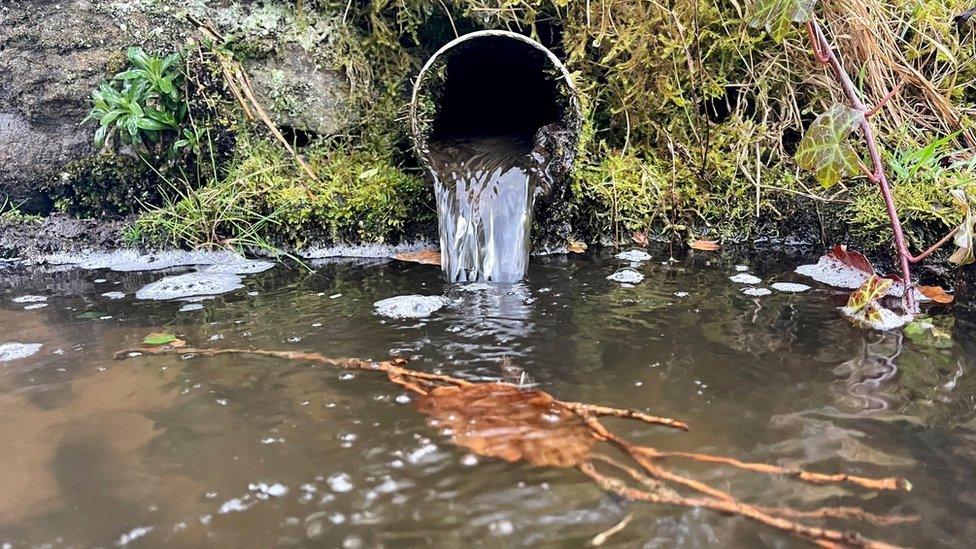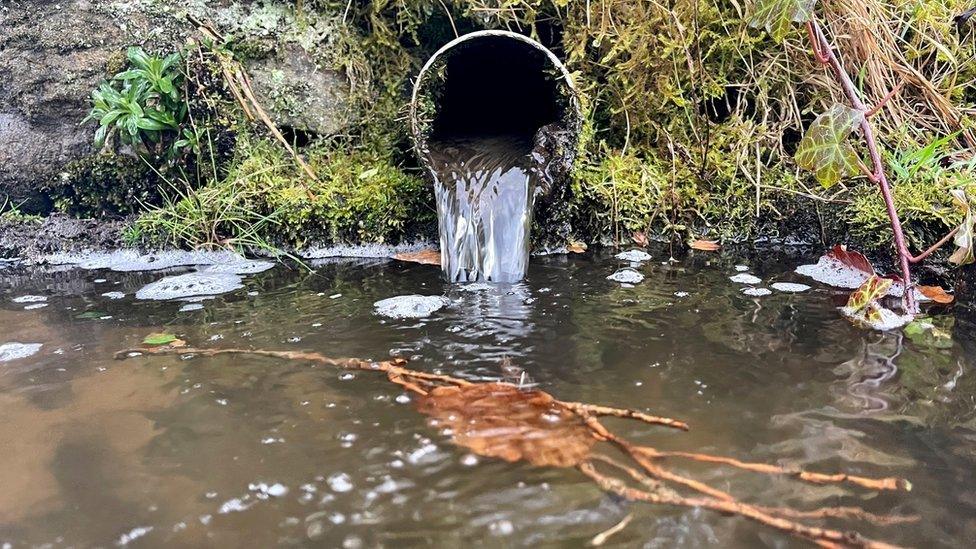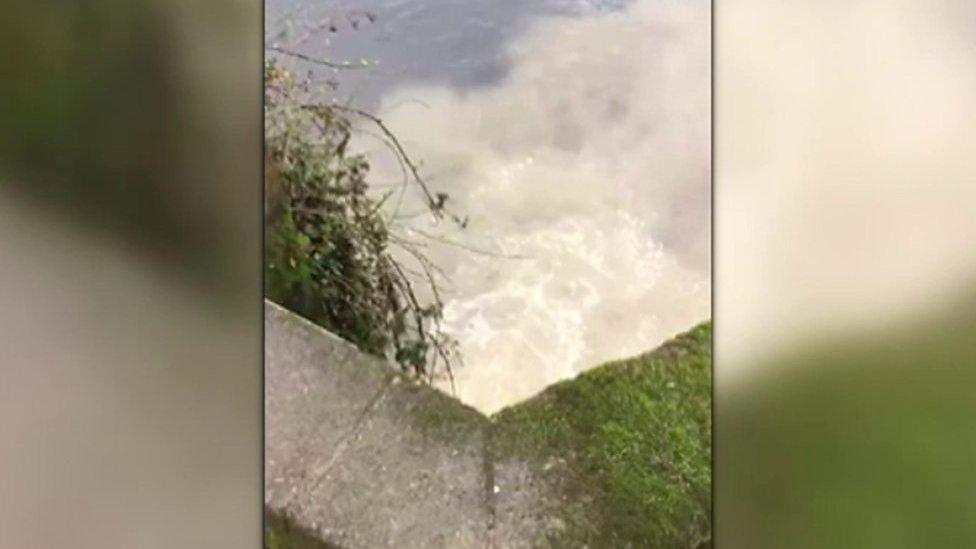Welsh rivers had 100,000 sewage spills in a year
- Published

The River Usk in Monmouthshire is just one Welsh river falling foul of sewage discharges
Raw sewage was dumped into Welsh rivers more than 100,000 times last year - for almost 900,000 hours.
The discharges happened across more than 2,000 water treatment works and sewer overflows across the Dŵr Cymru Welsh Water network in 2020.
But the not-for-profit operator has insisted it is working to meet all environmental regulations.
It said more monitoring equipment meant more sewage spills were also being detected.
The details of how many "spills" from combined sewer overflows (CSOs) happened in Wales in 2020 come from Welsh Water itself, and campaigners said they accepted the firm was "far better" than other companies in the industry on transparency.
It follows a BBC Panorama investigation, which accused Welsh Water of breaching regulations on sewage discharges on the River Usk in Monmouthshire.
The company told the programme it did not accept its sites were operating illegally.
"We continue to invest significantly in our network so that we minimise the impact of our activities on the environment," said a Welsh Water official.
"However, these solutions and processes can sometimes take many years to resolve in order to fully investigate, design solutions, and secure funding."
The water firm said it was spending £42m in a five-year programme to upgrade its storm overflow network, with £19m being spent on 300 treatment works to ensure they were monitored and met permit conditions.


But Afonydd Cymru, the umbrella body representing six river trusts across Wales, said it was pressing Welsh Water on the issue, following the Panorama investigation.
"Have we got a complete failure in terms of regulatory enforcement on CSOs?" asked the body's chief executive Gail Davies-Walsh.
Official figures from Welsh Water show there were 106,094 discharges from its CSO sites in 2020.
In total, the combined time sewers and treatment workers were spilling untreated effluent into rivers reached 872,976 hours.
One treatment works at Coed y Cwm in Rhondda Cynon Taf was discharging into the River Taff for 2,959 hours during the year, in what was termed 180 "significant spill" incidents.
Another nearby works at Cilfynydd near Pontypridd was also sending sewage into the river for a total of 2,877 hours, in another 162 spill incidents.
Parts of north Wales fared even worse.
The Llanfestiniog treatment works in Gwynedd was discharging sewage for 4,375 hours into a stream feeding the Afon Cynfal during the year, with monitors recording 346 spill incidents.

What is a Combined Sewer Overflow?

There are about 3,000 combined overflow outfalls on the Welsh water network
Combined storm or sewer overflows (CSOs) play an essential role in stopping sewage from backing up into homes and businesses when it pours down or threatens to flood.
They usually release storm waters into rivers or the sea.
There are about 3,000 CSOs across the 23,000 miles (3700km) of sewer networks in Wales.
Welsh Water said each one, along with more than 800 waste waterworks, are all tightly regulated by Natural Resources Wales and operate under strict permit conditions.
It also said it was important to recognise climate change has brought more frequent extreme weather events to Wales, with 2020 named the third wettest winter on record since 1910.

Gail Davies-Walsh at Afonydd Cymru said the overall discharge figures for Wales were "massive".
"Am I surprised? Not really. We unfortunately knew they were of this scale," she said.
"But we have to be careful here. That is the number of spills. The question I am asking Welsh Water to answer is: 'Of that number - how many are outside their permits?"
Welsh Water said its operations are "highly regulated and closely monitored" by the Welsh government's environment authority, Natural Resources Wales.
"Whilst CSOs are mainly operating as designed and permitted, we do recognise that more needs to be done," added a spokesman.
"However, this requires significant additional funding and development of infrastructure and will take many years to deliver."
The operator said it had installed an additional 1,000 spill monitors at overflow sites since 2017, covering more than 90% of its CSOs.
"This is a crucial first step so that we can identify and understand the scale of the issues we need to address," they added.
- Published12 April 2021

- Published31 March 2021

- Published15 March 2019
